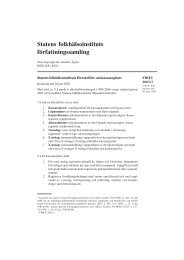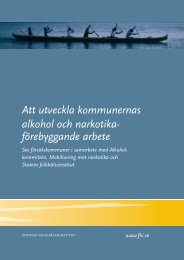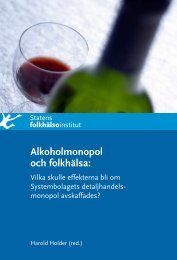Gambling Among Young People, 837 kB
Gambling Among Young People, 837 kB
Gambling Among Young People, 837 kB
You also want an ePaper? Increase the reach of your titles
YUMPU automatically turns print PDFs into web optimized ePapers that Google loves.
other addictions<br />
According to most studies, young people who gamble often and with high stakes also consume more<br />
alcohol than their peers who gamble less. The corresponding link also exists between being a problem/pathological<br />
gambler and having other types of addiction problems with alcohol and drugs, a<br />
connection that is particularly clear in boys (3, 12, 21, 32–34, 59, 60, 67–70, 72, 85, 87, 90, 95–99).<br />
differences between young pathological gamblers<br />
and young problem gamblers<br />
In the above-mentioned longitudinal study by Winters and Stinchfield in Minnesota in the USA, 305<br />
young people were followed from the age of 16 to the age of 24. The young people were not only<br />
asked about their gambling habits, problem/pathological gambling but also about their mental health,<br />
crime, schoolwork and their parents’ gambling history. It was clear that young pathological gamblers<br />
and young problem gamblers respectively and those<br />
without a problem differed in a number of ways. The<br />
young people who were pathological gamblers suffered<br />
from mental ill health, for example depression<br />
and anxiety symptoms, more often than other young<br />
people including those with a gambling problem.<br />
These young people also tended to have parents who<br />
were problem/pathological gamblers compared to the<br />
other young people in the study. The young people<br />
who had a gambling problem were, on the other hand,<br />
more prone to criminal behaviour compared to both<br />
young people without a gambling problem and those<br />
who were pathological gamblers. Two of the groups,<br />
problem gamblers and pathological gamblers, had<br />
difficulties at school and the young people in these<br />
groups had started gambling earlier than other young<br />
people (74).<br />
Pathological gambling – not a chronic state<br />
Only very few studies have followed young people over a number of years to see how their problem or<br />
pathological gambling has developed and whether the problems remain in adulthood or whether there<br />
has been an improvement. However, according to the few studies that are available problem gambling<br />
in young people does not appear to be a “chronic state”. Usually it is seems to be a temporary state<br />
that abates with age.<br />
An American study by Slutske, Jackson and Sher followed 468 university students over an elevenyear<br />
period, from the age of 18–19 to 30. The proportion who were problem/pathological gamblers in<br />
the group remained constant throughout the period, at 2–3 per cent. However, at each interview new<br />
people, 1–2 per cent of all the students had developed a gambling problem/addiction while others had<br />
improved. A person who had had gambling problems at one stage increased the risk of suffering from<br />
such a problem later on in life. The risk was greatest 3 to 4 years after the initial gambling problem<br />
had surfaced but with time the risk decreased, even if it was still higher than for those who had never<br />
had a problem (73).<br />
Winters and Stinchfield followed 305 young people in Minnesota, USA, from the age of 16 to the<br />
age of 24 and asked them about possible problem/pathological gambling at three opportunities. They<br />
found that most were totally problem free for the entire period (60 per cent). Second most common<br />
was being a problem or pathological gambler at two but not all three of the screenings (34 per cent).<br />
Only 4 per cent were problem or pathological gamblers for the entire period, at all three screenings.<br />
Those who were pathological gamblers seemed to have a less temporary problem than those who had<br />
37

















